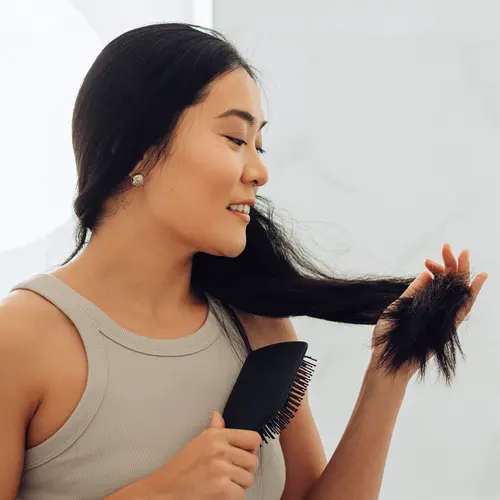Like snowflakes, no two faces are identical, even on identical twins. The color of skin, eyes, and hair varies, as does the shape of people's eyebrows, cheekbones, lips, and noses.
How skin ages also varies. Knowing how your lifestyle and the environment affect your skin helps you choose the skin care routine that's best for you.
Skin Care 101: What Is Your Skin Type?
Dermatologists organize skin into six types with type I being the lightest and type VI being very dark. "People who are a four or above have more melanin in their skin, which protects them from the sun," says Columbia University dermatologist Monica Halem, MD.
People who have darker skin often look younger than their lighter-skinned peers. "A black African with skin type VI, for example, doesn't feel the aging effects of the sun as much as a blond-haired, blue-eyed, light-skinned person of Scandinavian descent at a level one," Halem says.
More melanin, though, puts skin at higher risk of scarring and pigmentation problems. Also, people with darker skin are not completely safe from sun damage, so it's important to wear sunscreen, even if you have dark skin.
What Happens to Aging Skin
As you age, your body begins to slow production of collagen and elastin. This leads to fine lines and wrinkles. Add in sun exposure and gravity, and skin can sag.
Your skin keeps changing as you get older. It becomes thinner, drier, and more fragile as skin's inner layer (the dermis) starts to thin. Fat beneath the skin in your cheeks, chin, and nose disappears, making skin sag. Facial hair increases and women going through hormonal changes may get acne.
For people with oily skin, breakouts may never stop as they age. But oily skin does have a plus: It wards off wrinkles better than dry skin because the oils keep skin moister and smoother.
Using moisturizer is one way to lessen the impact of wrinkles before they appear. If you have oily skin, you can keep your skin clear and less wrinkled with hypoallergenic moisturizers.
Your body's ability to fight free radicals that attack and damage cells and collagen also slows with age. Antioxidants work to protect skin of free radicals and improve its appearance, repairing damage and moisturizing the skin. Antioxidants are found in vitamins C, E, and A, which should be a regular part of a healthy diet. Many skin care products now include these antioxidants in their formulas as well.
The Glaring Facts of Sun Damage
Past sun damage catches up with you in the form of age spots and wrinkles -- no matter what your skin type. "Some of this happens naturally with age, but you don't want to accelerate the wrinkling process," dermatologist Marilyn Berzin, MD, says.
"What can accelerate the process is sun exposure and damage to the skin from the environment. Sun exposure is the number one cause of harm to the skin," she says. And no type of skin is immune to sun damage.
The sun cases 90% of skin damage. Wear sunscreen every day.
- Pick a sunscreen that blocks both UVA and UVB rays (it should say "broad-spectrum" on the label). An SPF of at least 30 provides protection against both these rays.
- Apply sunscreen before going outdoors.
- Reapply sunscreen at least every two hours, and more often if you are sweating or getting in and out of the water.
- Wear a wide-brimmed hat and protective clothing, like a long-sleeved shirt and pants. Even with sunscreen, you should take precautions, such as limiting your time in the sun, especially between the hours of 10 a.m. and 2 p.m., when the sun's rays are the strongest.
Your Skin Care Choices
Secondhand smoke, cleaning chemicals, and air pollution can all cause skin problems.
Chronic stress can also take a toll. "Stress produces hormones that increase the levels of free radicals in the body, suppresses the immune system, dehydrates the body, and thins the skin," Berzin says. It can also lead to acne, upset your body's ability to help skin renew and replenish itself, and cause hives, eczema, itching, or redness. Stress also wears down the body's ability to fight free radicals and bacteria.
Making better lifestyle choices can help you reap the rewards of healthier skin.
- Exercise. Exercising can reduce stress and help you sleep better, leading to healthier skin.
- Get plenty of sleep. "Sleep is your skin's chance to repair damage done during the day," Halem says. Seven to eight hours a night allows your face to relax and smooth wrinkles, avoid dirt and grime in the air, and rejuvenate.
- Eat healthy, look healthy. "We definitely know foods can affect skin because we see it when there is a deficiency," Berzin says. "If there is a deficiency in vitamin C, it can cause scurvy. A deficiency in zinc can lead to a scaly, red rash. An iron deficiency can lead to hair loss. The best thing you can do for your skin is to eat well-balanced meals."
- Think before you drink. Dermatologists recommend drinking water to moisturize your skin from within. "When you drink water, the cells absorb that water and look plumper, smoothing out wrinkles," Halem says. The opposite is true of beverages that dehydrate the body and skin, especially alcohol and caffeinated drinks. Coffee, alcohol, and soda can also deplete the body of nutrients that keep skin from looking tired and dull, cause facial flushing, and worsen skin conditions such as rosacea.
- Don't smoke. Smoking is second only to sun damage in causing wrinkles and dry skin. Studies have shown that smokers have significantly more fine wrinkles than nonsmokers.


